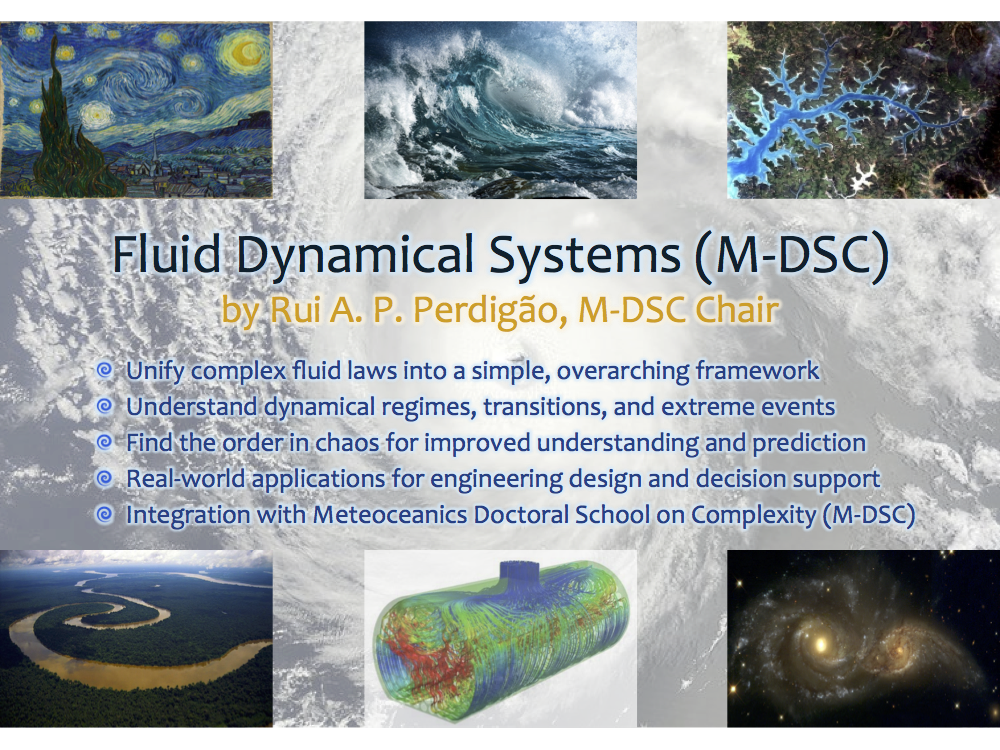The general program encompasses a brief review on fluid dynamics and physics of complexity, then progressing to an in-depth presentation of the recent fundamental contributions from the coordinator shaping this field beyond the realms of both fluid mechanics and dynamical systems. In this sense, Fluid Dynamical systems are neither to be confused with fluid mechanics nor with dynamical systems approaches to fluid flow.
I: Motivation and Fundamentals
The course begins with a general motivation to the study of Fluid Dynamical Systems, by introducing their fundamental concepts and illustrating their relevance to a wide spectrum of scientific, engineering and operational challenges.
II: Classical Fluid Dynamics
The classical part of the course builds on basic knowledge in Fluid Mechanics and Thermodynamics to formulate the basic principles governing fluid flow.
The notion of fluid is then revisited and generalised to a broad class of dynamical systems, paving the way for an integrated treatment of fluid-structure interactions with overarching span.
-
- Fundamental Definitions and Governing Principles
- Fluids in Motion: Descriptive Kinematics
- Fluids in Action: Fundamental Dynamics
- Fundamental Constraints: Thermodynamic Limits
- Dynamic Similarity and Scaling Physics
- Boundary Layers, Instability and Turbulence
- Numerical and Computational Fluid Dynamics (CFD)
III: Fluid Dynamical Systems
Fluid Dynamical Systems are then formulated in the light of Mathematical Physics, providing an intuitive yet rigorous treatment of complexity in a simple, coherent framework, shedding light over empirical Classical Fluid Dynamics, and providing a physical background to stochastic behaviour and uncertainties in complex fluid regimes.
-
- Fundamentals of Dynamical Systems: Diagnostic and Prognostic Laws
- Beyond the Mechanistic Paradigm: the Stochastic Physics of Fluids
- Beyond Stochastic-Dynamics: new Mathematical Physics of Fluids
- Fluid Flow as a Dynamical System: Complexity made Simpler
- Thermodynamics of Fluid Dynamical Systems: Finding Order in Chaos
- Redefining Thermodynamic Limits: Coevolution in Transient Systems
- Nonlinear Interactions and Emergence: The role of Synergies
- Regime Dynamics and Clustering: Leptogenesis, Accretion and Coalescence
- Information Physics in Fluids: Beyond Statistics and Kinematic Geometry
- Predictability Laws: Dynamics of Uncertainties in Fluid Dynamical Systems
IV: Real-World Applications
Real-world applications are presented for natural and built environments, along with their interactions, relevant for engineering design and decision support in the wake of hydro-meteorological hazards and fluid-structure interaction challenges in a changing world. The course is concluded with frontier topics on fluid dynamical systems ranging from quantum mechanical to cosmological applications.
-
- Geophysical Fluid Dynamics: Multiscale Fluid Dynamics in the Earth System
- Magnetohydrodynamics: Understanding and Predicting Solar and Geomagnetic “Weather”
- Numerical Prediction Systems: Operational CFD and decision support in hydro-meteorological applications
- Fluid-Structure Interactions: Aero-Hydrodynamics in built and natural environments
- ‘Big data’ analytics and model optimisation: Information retrieval, lossless data compression, dynamic model design and optimisation
- Frontier Topics: Fluid Dynamical Systems across scales: from Quantum Mechanics to Astrophysics and Cosmology.
TAKE-HOME MESSAGES:
-
- Unify complex fluid laws into a simple, overarching framework
- Understand dynamical regimes, transitions, and extreme events 
- Find the order in chaos for improved understanding and prediction 
- Real-world applications for engineering design and decision support
Course Coordinator: Rui A. P. Perdigão
Cite as:
Perdigão, R.A.P. (2016): Course on Fluid Dynamical Systems. https://doi.org/10.46337/uc.160301.
A promotional poster for the academic program in Fluid Dynamical Systems is presented below:

For further information:
You may also wish to take a look at some of our courses e.g. on Information Physics and Evolutionary Complexity and Complex System Dynamics, along with the full list of Doctoral School courses introduced by Rui Perdigão at the Meteoceanics Institute and available at partner universities.